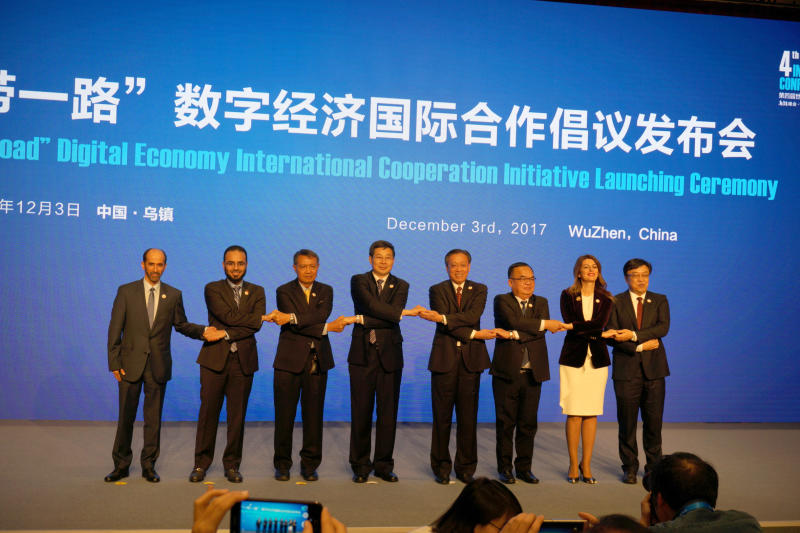China continues to push for its vision of the Internet
Sign up now: Get insights on Asia's fast-moving developments

Signatories from China, Thailand, Laos, Saudi Arabia, Serbia, Turkey and the United Arab Emirates agreed to cooperate on digital development.
ST PHOTO: LIM YAN LIANG
Follow topic:
WUZHEN (China) - China has renewed its call for "cyber sovereignty" at the opening of its fourth World Internet Conference, an annual event here designed to advance its vision of a more censored and controlled cyberspace.
Beijing, which has long pushed for greater multi-government regulation of the Internet, on Sunday (Dec 3) also launched an "international cooperation initiative" to develop the digital economy that aims to give it greater say in cyberspace rules-making.
"China will never close its doors: they will only be opened wider and wider going forward," President Xi Jinping said in a message read by Huang Kunming , head of the Chinese Communist Party's (CCP) publicity department.
But this openness is premised on cyber sovereignty, the concept that each country should be able to govern its own Internet space like a physical territory.
Delivering the keynote address, Politburo Standing Committee member Wang Huning said that more countries are buying into this vision and other Chinese concepts - such as the "orderly flow" of data resources - in part because of the irresistible size of the Chinese Internet market.
Mr Wang pointed out that China, which has more than 750 million Internet users, saw its cross-border e-commerce volume more than triple from 2.1 trillion yuan (S$427 billion) in 2012 to some 6.7 trillion yuan last year.
"The digital economy is an important breakthrough to promote the reform of the global cyberspace governance system," he said. "It is a key area to build a community of shared future for mankind in cyberspace."
Apple and Google have, for the first time, sent their head honchos to the conference, which is co-organised by China's Internet regulator and censor. It is taking place as Beijing has tightened control of its Internet over the past year, such as with new laws that require firms to store data locally.
In his speech, Apple CEO Tim Cook stressed that the Cupertino-based tech giant is a longtime partner of China, supporting five million jobs in the country. This includes 1.8 million developers that have collectively earned over 112 billion yuan through its app store, he added.
"We believe technology can be the greatest force the world has ever known for creating opportunity and lifting people out of poverty," he said, a nod to Mr Xi's signature policy to alleviate poverty in China by 2020.
"But technology itself doesn't want to be good - it doesn't want anything. It's up to us, all of us, to ensure that technology is infused with humanity."
Mr Cook and Apple came under fire earlier this year for agreeing to Beijing's request to remove hundreds of VPN apps from its Chinese appstore that allowed users to circumvent China's Great Firewall which blocks a number of Western websites including Facebook, Twitter and Google.
Cisco Systems CEO, Mr Chuck Robbins, also endorsed the multi-government approach to Internet governance.
He said: "Given the complexity of the technology and the speed at which things are changing, no one company, no one country, can do it alone."
In a 45-minute panel discussion that was not confirmed till the last minute, Google Inc CEO, Sundar Pichai, said the tech giant has helped many Chinese companies go abroad, including a silk carpet company that now sells to more than 60 countries .
He added that Google believes that democratising technology and "building large, open platforms and eco-systems" is key to ensuring technology plays a positive role in development.
Google's search engine and other services such as Gmail, Google Maps and YouTube are blocked in China.
China and six other countries - Thailand, Laos, Saudi Arabia, Serbia, Turkey and the United Arab Emirates - also agreed on Sunday to cooperate on digital development, such as by aligning national policies and aiming to co-develop international standards on digital technologies.
The seven countries, which include Thailand, Laos, Saudi Arabia, Serbia, Turkey and the United Arab Emirates, will push for "an international Internet governance system which is multilateral, open and transparent", said Mr Lin Nianxiu, vice-chairman of the National Development and Reform Commission.
Five of these seven countries rank in the bottom 15 out of 65 countries in advocacy group Freedom House's 2017 Internet Freedom rankings, with China in last place. Laos and Serbia were not included in the rankings.

